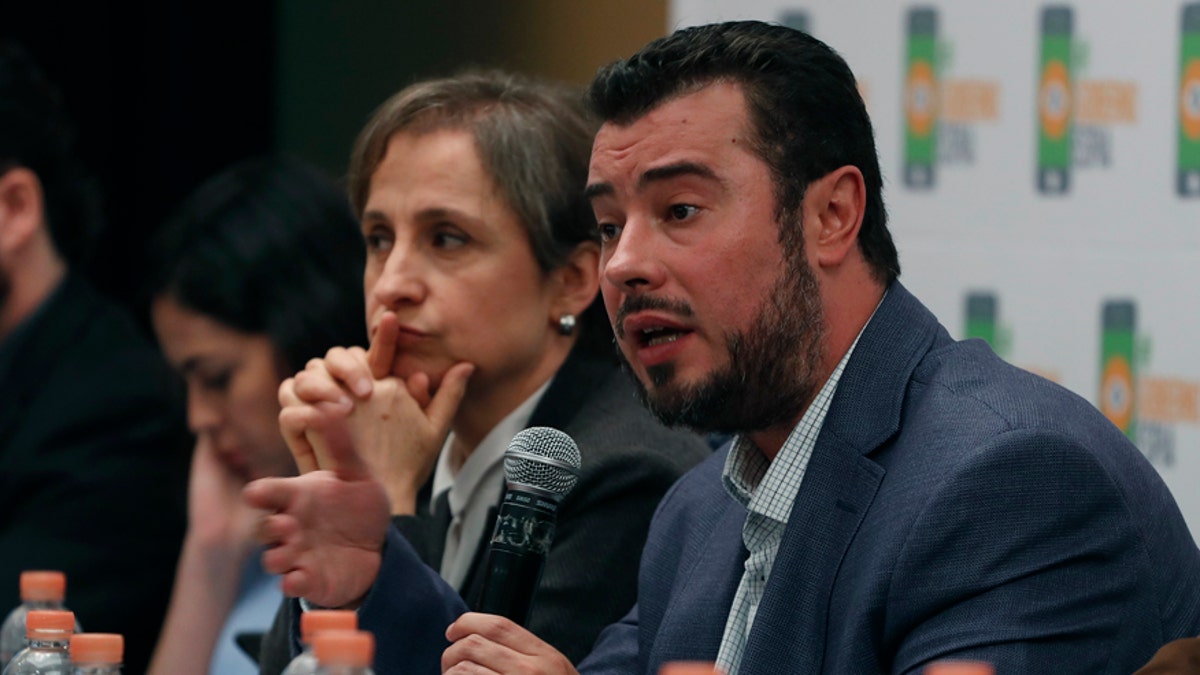
Mario Patron Sanchez, director of the Miguel Agustín Pro Juárez Center for Human Rights, talks during a news conference, seated next to Mexican journalist Carmen Aristegui, in Mexico City on Monday. (AP Photo/Eduardo Verdugo)
Several prominent journalists and activists in Mexico are accusing the government of spying on them by hacking into their phones.
A criminal complaint filed with the Attorney General’s Office on Monday by nine people follows a report by Citizen Lab at the University of Toronto which claimed that Mexican journalists, lawyers and activists were targeted by spyware.
Among the targets were journalists Carmen Aristegui and Carlos Loret de Mola, who were investigating alleged government corruption and purported human right abuses by security forces.
COLOMBIAN REBELS BELIEVED TO BE HOLDING 2 DUTCH JOURNALISTS
“The agents of the Mexican state, far from doing what they should be doing legally have used our resources, our taxes, our money to commit serious crimes,” Aristegui said at a news conference in Mexico City, the BBC reported.
The report comes at a time when Mexican journalists and human rights defenders already feel under attack. Six journalists have been killed this year.

Mexican journalist Carmen Aristegui at a news conference on Monday. (AP Photo/Eduardo Verdugo)
"Enrique Pena Nieto must explain," Aristegui said.
"We don't know if the journalists killed were spied on beforehand," she said. "We don't know if something happened, but in light of this we have a right to think it."
Aristegui, who exposed a case of possible conflict of interest involving a luxury home acquired from a government contractor by President Enrique Pena Nieto's wife, was aggressively targeted according to Citizen Lab.
The Mexican government has “categorically” denied the allegations, saying that just like any other democratic country, it conducts intelligence operations to combat organized crime and defend national security. It denied any illegal spying.
VENEZUELA WALKS OUT OF AMERICAS SUMMIT IN MEXICO
Titled “Reckless Exploit,” the report said the people targeted received message with links, that when clicked on, opened up their devices to being exploited and spied upon. It used spyware produced by Israel’s NSO Group that is sold exclusively to government, the internet watch group said.
NSO's Pegasus spyware allows hackers access to phone calls, messages, cameras and personal data. The company says it sells the product only to governments for the purposes of fighting crime and terrorism.
Citizen Lab said it had "no conclusive evidence attributing these messages to specific government agencies in Mexico. However, circumstantial evidence suggests that one or more ... of NSO's government customers in Mexico are the likely operators."
The report noted that the targets involved “domestic issues of immediate concern to powerful Mexican interests” and the government, and that “multiple government agencies in Mexico are reportedly NSO customers.”
“The messages were both brazen and extremely obvious. ... Were these messages sent to lower-profile private individuals, the ruse may never have been discovered. But instead, the messages were sent to very high profile and well known journalists, increasing the likelihood of discovery,” Citizen Lab said.
Citizen Lab said it documented at least 76 messages containing links to the security exploit. Many were sent in August 2015 or between April and July of the following year.
Loret de Mola, in a recorded message played at a news conference Monday in Mexico City, said initially he declined to participate because in the context of Mexican journalists being killed the spying seemed minor. He has a news program on the Televisa network and writes a column for El Universal newspaper.
But upon further reflection he changed his mind “because spying opens the door to go farther: the intimidation, the harassment, the censorship, the firings, the beatings, the abductions, the kidnappings, the disappearances, the murders, the impunity that makes it likely that none of this is investigated, that none of it is punished,” he said.
Other targets included members of the Centro Miguel Agustin Pro Juarez, a prominent human rights group that has investigated cases such as the disappearance of 43 students whom police allegedly detained and turned over to drug gang killers; the anti-graft group Mexicans Against Corruption and Impunity; and the Mexican Institute for Competitiveness, a civil society group working on economic policy and combatting corruption.
Frank Smyth, executive director of the U.S. group Global Journalist Security, called Citizen Lab's report a reminder of the perils that spyware represents in an increasingly wired world.
“This is an escalation of surveillance, but it’s a predictable one considering our technological capabilities and potential,” Smyth said.
The Associated Press contributed to this report.




















